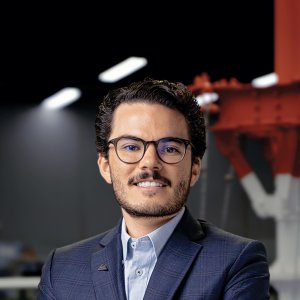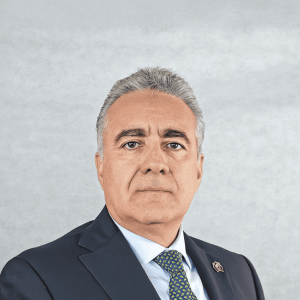Designing, Enabling the Future of Flight

STORY INLINE POST
Q: How is Honeywell Aerospace shaping the future of flight?
A: Honeywell Aerospace’s solutions are virtually found in every commercial and defense aircraft in the world. The company develops several products, from aircraft engines and auxiliary power units to cockpit avionics,cabin electronics, mechanical systems and connected solutions, among others.
Our innovations lead to more efficient aircraft, lower maintenance costs, improved flight planning and traffic management and, eventually, more efficient airports and sustainable flights. Honeywell provides customers with an extensive technical support network. We have a comprehensive presence in the market and the company is also pushing further innovation, such as unmanned aerial vehicles (UAV) and autonomous flight.
Q: How do Honeywell’s solutions help airlines to maximize fleet safety and optimize operational efficiency?
A: Honeywell provides airlines and cargo operators with solutions for flight efficiency. We base our solutions on data analytics to support customers with precise data that helps them reduce fuel consumption, lower carbon emissions, and make intelligent maintenance decisions to keep their fleets operating. Connected and predictive maintenance plays an increasingly important role within today’s aviation industry. Our connectivity solutions help our customers to improve their operations, and to remain profitable and competitive in a challenging market. More than 3,000 aircraft use Honeywell Forge Flight Efficiency globally.
Q: How is Honeywell innovating to move urban transportation from the road to the air?
A: Urban air mobility (UAM) remains a large challenge, but Honeywell Aerospace is fully on board and innovating to make it a reality. On top of the existing platforms, Honeywell is investing to develop new technologies for this market, which is new for everyone. UAM is a megatrend; while we do not know exactly when it will arrive, we are certain that it will become a reality.
Honeywell is a leading supplier in UAM technology. We already offer a wide range of technologies and solutions to help our customers to generate more sustainable aviation.. In addition, Honeywell has established strategic partnerships -to develop electric and hybrid-electric propulsion systems. Electrification will play an essential role in UAM, from propulsion systems to the entire aircraft. Finally, safety will play another key role in the success of electric and autonomous flight.
Q: What role does Mexico play within Honeywell Aerospace’s global operations?
A: Honeywell identified Latin America as a global hub, not just for aerospace but for its overall operations. We have an important presence in the Mexican industry, working with the largest fleets of business jet, commercial helos, and airline customers, from startup airlines to legacy carriers. We aim to continue playing an important role in the country and to continue supporting its growing aviation market.
Mexico is key for Honeywell Aerospace and the company’s investments in the country prove it. We will continue working together with local airlines, business jets and cargo operators to offer innovation and reliable products to make them more sustainable and profitable.
Q: How is Honeywell Aerospace betting on Mexico to run R&D and high added-value operations?
A: Mexico’s manufacturing footprint for the aerospace industry continues to grow. Honeywell has over 12,000 employees in the country and we are making significant investments. We have an R&D center in Mexicali that is doing a terrific job providing engineering and in-laboratory services for electronic and mechanical -products. We have a highly-qualified talent base to make this happen. On top of that, we recently expanded our engineering center in Mexico City’s Technopark, which is a first-of-its kind facility in Latin America and the third worldwide.
Q: What strategies is Honeywell implementing to secure supplies amid post-pandemic challenges?
A: The reactivation of economic activities in the post-COVID-19 environment brought supply chain challenges for all industries, including aerospace. Honeywell committed the company’s full resources to manage the impact of the pandemic and we collaborate closely with key suppliers. Our efforts included strategic forecasts to deliver components and services on time to customers, and collaborative planning with commercial partners and distributors to secure parts.
While the reactivation of the supply chain is a challenge in itself, it is important to emphasize that it comes in the context of a double-digit year-over-year increase in demand. We are seeing a substantial growth in the aviation industry so, when combining the reactivation of a complex supply chain with the increase in demand for our products, it brings additional challenges to keep serving our OEM and aftermarket customers. However, through good planning, right investment and hard work, Honeywell Aerospace has been working successfully to find solutions in the short term, while continuing to support the operations of our customers.
Q: What are Honeywell Aerospace’s main priorities for 2023?
A: The main focus for 2023 is to continue on the path to recovery in parts delivery and services.. Aircraft production has increased, and we are putting together plans to cope with it. Also, Honeywell will keep investing heavily on R&D to continue developing new technologies and solutions to increase our customers’ profitability.
On the other hand, people remain a key part of Honeywell. We will continue investing in our training and recruitment processes, bringing and retaining talents, while continuously improving the working environment..
Q: How is Honeywell Aerospace leading the industry’s path to carbon neutrality?
A: Honeywell invests heavily in sustainable solutions. The aviation industry has pledged to be carbon neutral by 2050. Honeywell will be carbon neutral by 2035. This is not just a commitment; it is a robust plan to achieve carbon neutrality 15 years before the industry does. Sustainability will remain among our key strategies for the coming years.
Honeywell International is a US publicly traded, multinational conglomerate that operates in four areas of business: aerospace, building technologies, performance materials and technologies and safety and productivity solutions.








 By Antonio Gozain | Senior Journalist and Industry Analyst -
Tue, 11/29/2022 - 12:00
By Antonio Gozain | Senior Journalist and Industry Analyst -
Tue, 11/29/2022 - 12:00
















